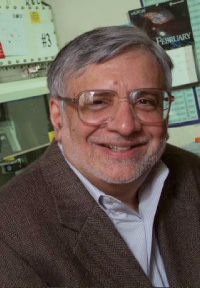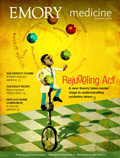Straight from the heart for HIV/AIDS

Rafi Ahmed, director,
Emory Vaccine Center
The powerful bond between parent and child is advancing the study of potential treatment targets for HIV/AIDS.
Last year, Concerned Parents for AIDS Research (CPFA), a New York-based group of parents, some of whom have lost children to AIDS, contributed $250,000 to the Emory Vaccine Center. The seed grant made it possible for Emory and Harvard to collaborate on studies of a protein that inhibits the immune response to chronic infectious diseases like HIV.
Two years ago, Emory and Harvard scientists discovered that the immune inhibitor protein PD-1 (programmed death-1) helps switch off the immune response to chronic infectious diseases, resulting in apparent “exhaustion” of the T-cell response.
Because of the progress made through the initial seed grant, the National Institute of Allergy and Infectious Diseases awarded a $13 million, five-year program project grant, allowing Emory and other scientists to focus on PD-1 and its specific role in HIV and other chronic viral infections.
Andrew Lipschitz, medical director of CPFA, believes that future success in stopping HIV/AIDS depends on sharing resources. “Our initial grant made sense because Emory had certain techniques and equipment that Harvard did not and vice versa,” he says. “By sharing their ideas and technology, Emory and Harvard were able to increase their understanding of PD-1 and qualify for the NIH grant, which will enable collaboration with more institutions and help scientists move more quickly toward finding treatments and cures for HIV.”
With the NIH grant, the research team now includes scientists from Emory, Dana Farber Cancer Institute, Harvard Medical School, Massachusetts General Hospital, New York University, the University of Montreal, and the University of Pennsylvania.
They plan to identify new targets, pathways, and drugs that could aim for PD-1, turn off this protein, reactivate the immune response, and possibly clear HIV infection.
There may be other benefits as well. “Our work has clear implications for the treatment of tumors and autoimmune diseases and for increasing the success of transplantation,” says Rafi Ahmed, project leader and Emory Vaccine Center director. Ahmed also is a new member of the National Academy of Sciences.—Holly Korschun


